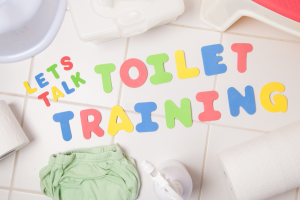 Constipation in children can occur for various reasons and can lead to bladder leaks and accidents. How do you know if your child is constipated? Constipation is considered
Constipation in children can occur for various reasons and can lead to bladder leaks and accidents. How do you know if your child is constipated? Constipation is considered
to be if someone poops less than 3 times a week and/or have stools that are hard and small. Constipation is common to occur when there are changes in routine and schedule, like the start of school, a new school building, or a new school classroom where the bathroom situation has changed. This can also occur at the beginning of potty training or if a child has had a painful poop. Bathroom situations that can change include restricted bathroom breaks, a bus commute, and a new bathroom environment like a longer distance to walk, needing a key, having to buddy up, having limited time, or increased anxiety/stress surrounding bathroom use.
It’s essential to identify the underlying cause to provide appropriate treatment ant management.
Here are some common pediatric causes of constipation:
 Diet: Insufficient intake of fiber-rich foods, such as fruits, vegetables, and whole grains, can contribute to constipation. Additionally, inadequate fluid intake may also play a role.
Diet: Insufficient intake of fiber-rich foods, such as fruits, vegetables, and whole grains, can contribute to constipation. Additionally, inadequate fluid intake may also play a role.

Toilet Training: Difficulty with toilet training or resistance to using the toilet can lead to holding back stool, causing constipation. It’s also important that appropriate toileting posture is used like placing a stool under the feet.

Medical Conditions: Certain medical conditions can cause constipation in children, such as hypothyroidism, celiac disease, metabolic disorders, and congenital issues.

Medications: Some medications, such as certain pain relievers, antacids containing
aluminum, and iron supplements, can lead to constipation as a side effect.

Lack of Physical Activity: Sedentary behavior or limited physical activity can contribute to constipation in children.

Food Allergies or Intolerances: Certain food allergies or intolerances may cause
gastrointestinal disturbances, including constipation.
Remember to keep an open line of communication with your child’s teacher/s to create a team effort in order to address any situational or behavioral factors in your child’s constipation.
 It’s crucial to consult a pediatrician if your child is experiencing persistent or severe
It’s crucial to consult a pediatrician if your child is experiencing persistent or severe
constipation. A physician can conduct a thorough evaluation, including a medical history,
physical examination, and, if necessary, additional tests to identify the specific cause of constipation and recommend appropriate management strategies. Treatment may involve
dietary changes, behavioral interventions, medications or supplements, addressing any underlying medical conditions and/or seeing a pediatric pelvic floor therapist.
Feel free to find me on IG @thepelvictrainer if you have questions or need
help finding a pelvic floor provider!














